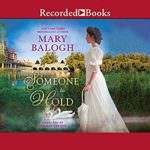 Narrated by Rosalyn Landor
Narrated by Rosalyn Landor
It’s a brave author who decides to write a novel in which one of the central characters is infuriatingly stubborn, who frequently, as the saying goes, cuts off her nose to spite her face, and who, because of those things is often downright unlikeable. In Unforgiven (originally published in 1998), the second book in her Horseman trilogy, Mary Balogh shows herself to be one such author, as she introduces us to Miss Moira Hayes, a young woman who is so intractable and determined to protect herself and her emotions that she almost loses her chance at happiness with the man she (won’t admit she) loves.
Indeed, for most of the book, Moira professes to hate Kenneth Woodfall, believing him to have been responsible, albeit indirectly, for the death of her brother some years earlier. Thus, his return to his Cornwall estate following his years of army service is an extremely unwelcome shock.
Kenneth, the Earl of Haverford, and his three friends, Rex, Viscount Rawley (Indiscreet), Nathaniel Gascoigne, and Eden, Lord Pelham, have all sold out of the army and returned home to England where, in the way of young gentlemen, they are living the high life, celebrating the fact that they’ve survived the Napoleonic Wars intact by living lives of cheerful debauchery. But when Rex decides he needs to return home, Kenneth also starts to think that perhaps it’s time he did the same, even if it’s only for a short visit so that he can see for himself that all is well before he returns to his life in London.
The recent death of her father means that Moira and her mother are now dependent on the relative who has inherited the estate, Sir Edwin Bailey. Sir Edwin is a well-meaning, but terribly pompous individual (think Mr. Collins in Pride and Prejudice), and he proposes that as he needs a wife and Moira needs a home, they should marry and secure happiness all round. At the age of twenty-six, Moira is firmly on the shelf and is well aware that she will have no other opportunity to marry, so she accepts his proposal even though she knows his constant pontificating and obsequious manner are likely to drive her insane.
The Woodfalls and the Hayes are neighbours who have nursed an ages-old feud for so long it seems the original reasons for it have been forgotten. Yet some eight years before this story begins Kenneth and Moira struck up a friendship that quickly turned into stolen kisses and talk of love – until she betrayed him and put an end to everything between them.
Kenneth’s return to Cornwall isn’t something Moira had expected or looked for. She still hasn’t forgiven him for the fact that an action of his part forced her brother to join the army and thus precipitated his death. Kenneth is just as surprised to find Moira still living with her mother; he had thought she would have married and moved away by now, and even though he hasn’t forgiven her for her betrayal all those years ago, he hopes that perhaps they can reach some sort of accord while he is in Cornwall meaning they can at least meet without animosity. But Moira is having none of that, and their meetings are frosty on his side and openly hostile on hers.
It’s obvious that the intensity of Moira’s dislike is due to something other than – or as well as – loathing, and that Kenneth’s coldness is a direct reaction to her treatment of him. These are two people who appear to be locked in a self-perpetuating cycle of mutual distrust, neither of them wanting to take the first step towards reconciliation for fear that the other will scorn it and reject them. When they are stranded during a snowstorm and end up having to spend the night together (unfortunately making use of one of the oldest clichés in the book) it seems as though they might be forced into facing up to the truth and trying to work out their differences; but even then, Moira is so determined not to show any sign of weakness or admit that she might actually need Kenneth’s help that she keeps pushing him away. And she does this even though, in her more rational moments, she recognises how unwise she is being and that she has to tell him that their night together has had consequences.
The central part of the story, in which Moira continually procrastinates over a number of key decisions, is frustrating, but on the other hand, her reasons for delaying are quite plausible. The tragedy that befalls the couple is handled sensitively and realistically; Ms. Balogh once again displays her talent for writing about life and relationships in all their glorious messiness, and while Moira’s intransigence made me want to scream and Kenneth sometimes comes across as cold and insensitive, the characterisation and writing is so good that it’s easy to understand why they act as they do. For all the author’s skill, though, the listener is undoubtedly helped to this understanding by Rosalyn Landor’s excellent performance, in which she gets so far under the skins of these people as to be able to bring out every emotional nuance and make them, at the very least, sympathetic, even if ‘likeable’ is a way off.
In spite of the fact that Moira seemed to be almost unable to stop herself from sabotaging her every chance at happiness, I did enjoy listening to Unforgiven. It’s not an easy book and it won’t suit everyone, but if you enjoy stories in which the couple really has to WORK at being together and in which the emotions are realistically complex, confused and sometimes unpleasant, then it might work for you as it did for me. I have to say as well that the ending is rather rushed; it isn’t until around forty minutes before the end that Kenneth and Moira finally admit their feelings and agree to remain together, so there isn’t a lot of time spent on post-declaration lovey-doveyness. But that’s okay. What we DO get is enough to convince that they are on the right road – finally – and that while it’s not going to be easy, they are going to make something of their marriage and enjoy their lives together.
It’s testament to Ms. Balogh’s skill as a writer and Ms. Landor’s as a performer that in spite of the negative things I’ve said in this review, I’ve still given a B grade for content. This is one of those books that benefits greatly from the input of an experienced and insightful narrator, and I honestly can’t think of anyone else who could have pulled off this tricky and sometimes dark story with such aplomb. I don’t need to say that Rosalyn Landor delivers another flawless performance because anyone who listens to her regularly will know that her technical ability is beyond doubt; it’s the emotional understanding and intelligence she brings to her performances that draws me in over and over again, and it’s that which makes Unforgiven such a compelling listen. I noticed that the book has very mixed reviews and I suspect that reading it would not have been quite so satisfying. In audio, however, with the advantage of an expert narrator bringing the characters and their motivations to vivid life in the imagination, it’s a rewarding experience and one I’d recommend to others who like a bit of angst served up with their romance plat du jour.
Caz
Narration: A+
Book Content: B
Steam Factor: Glad I had my earbuds in, but at the tame end
Violence Rating: None (Trigger Warning: there is a miscarriage which takes place “on screen” although it is not graphic)
Genre: Historical Romance
Publisher: Recorded Books [jwl-utmce-widget id=32435]




1 thought on “Unforgiven by Mary Balogh”
Comments are closed.